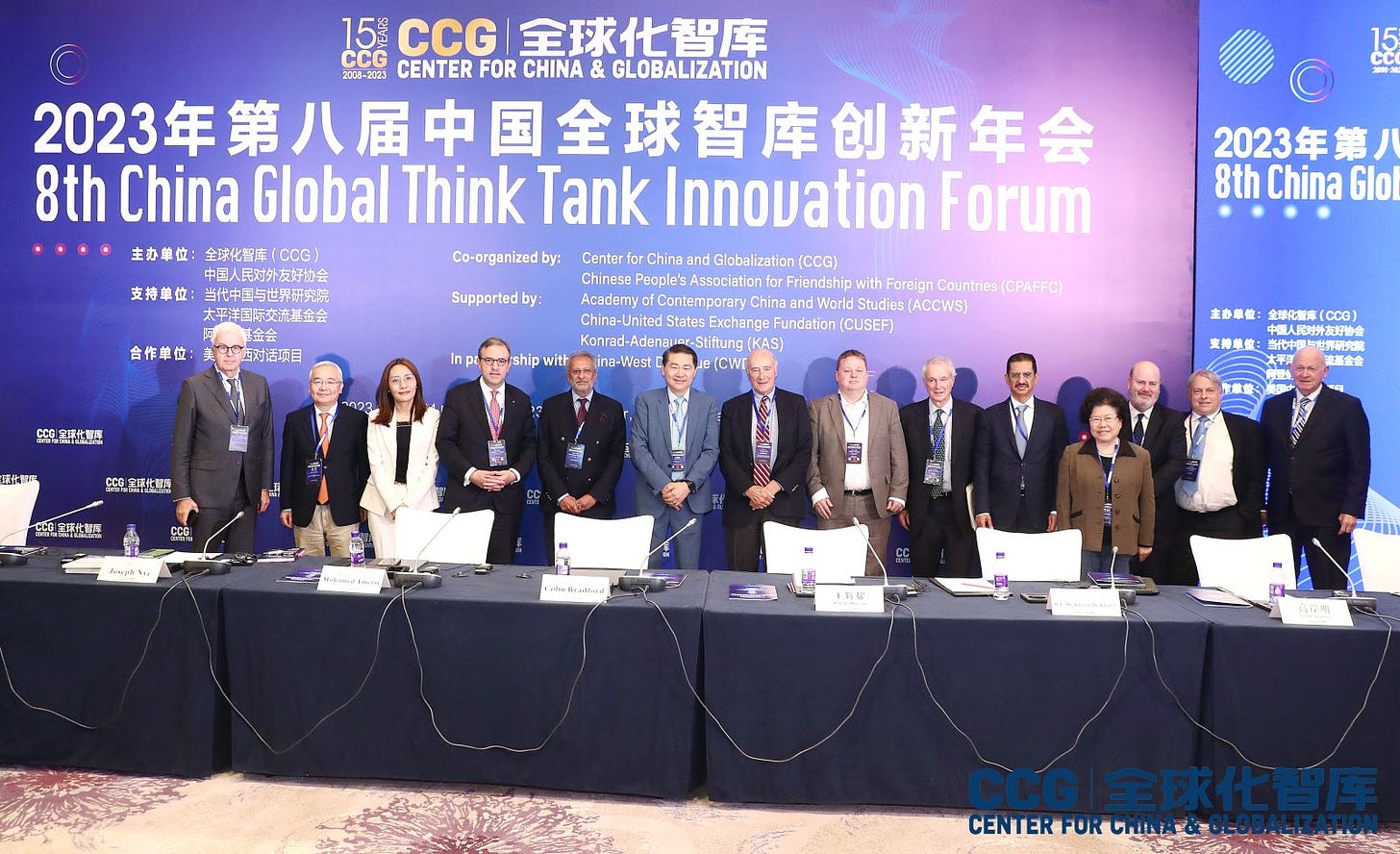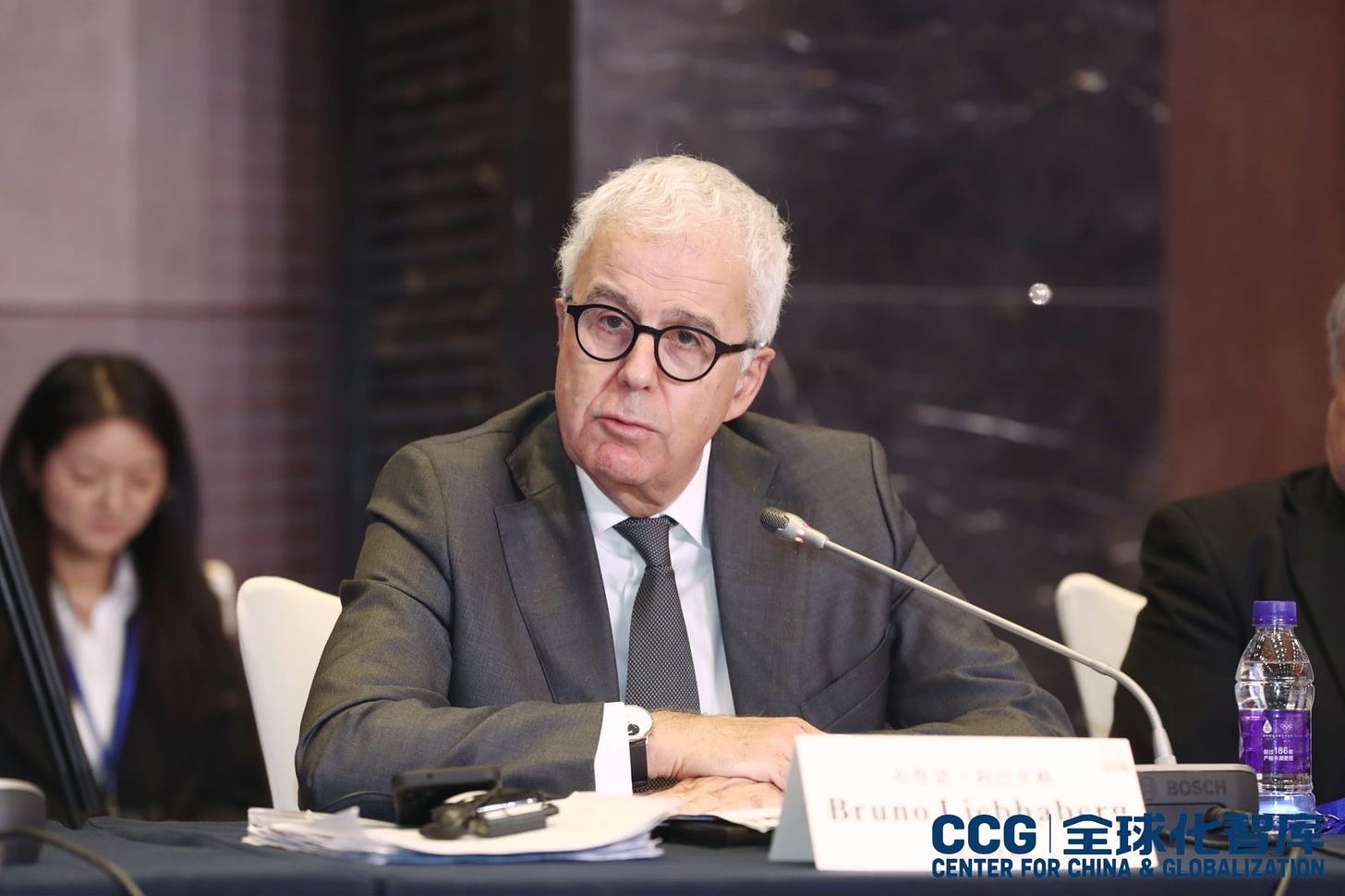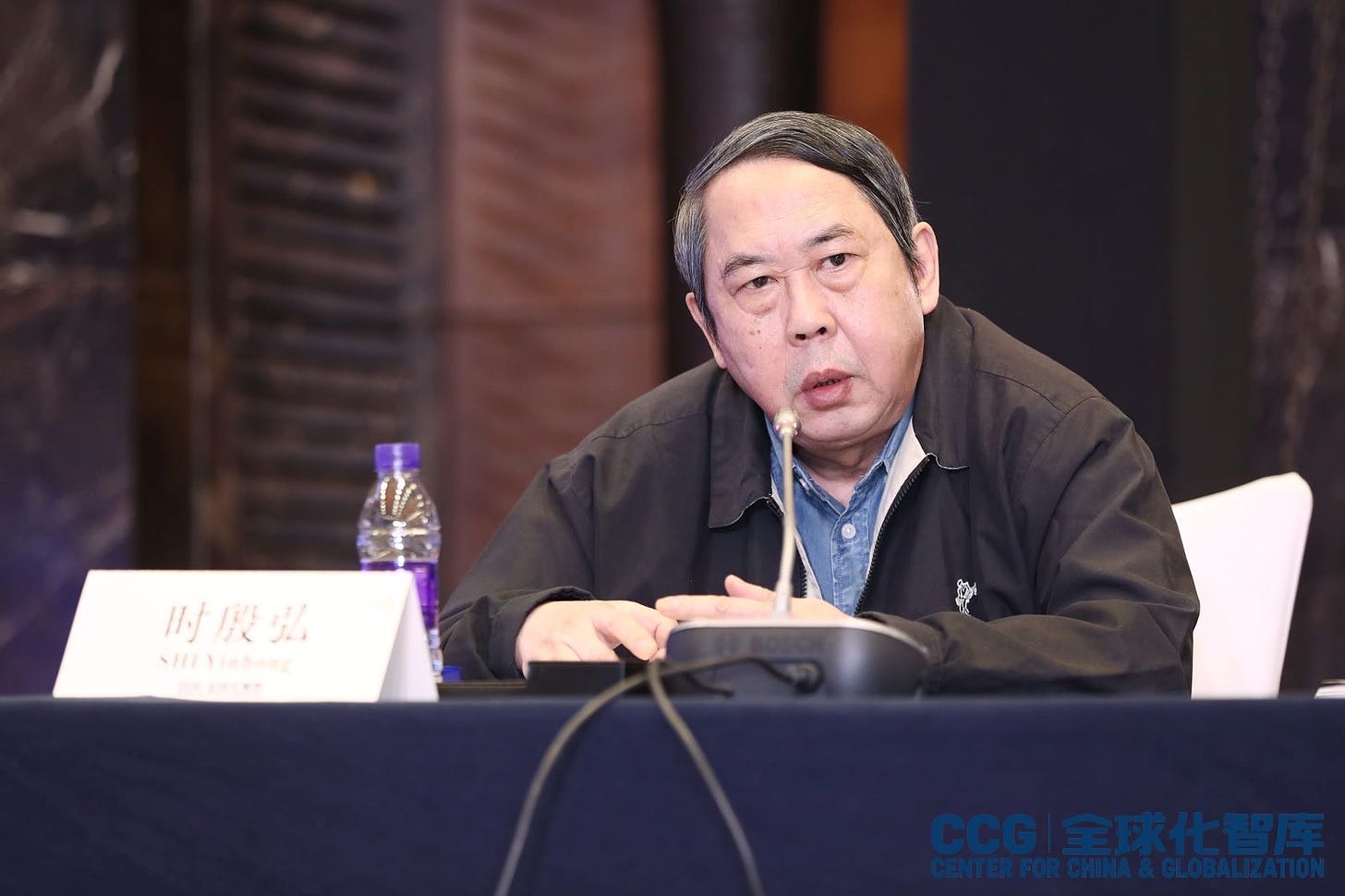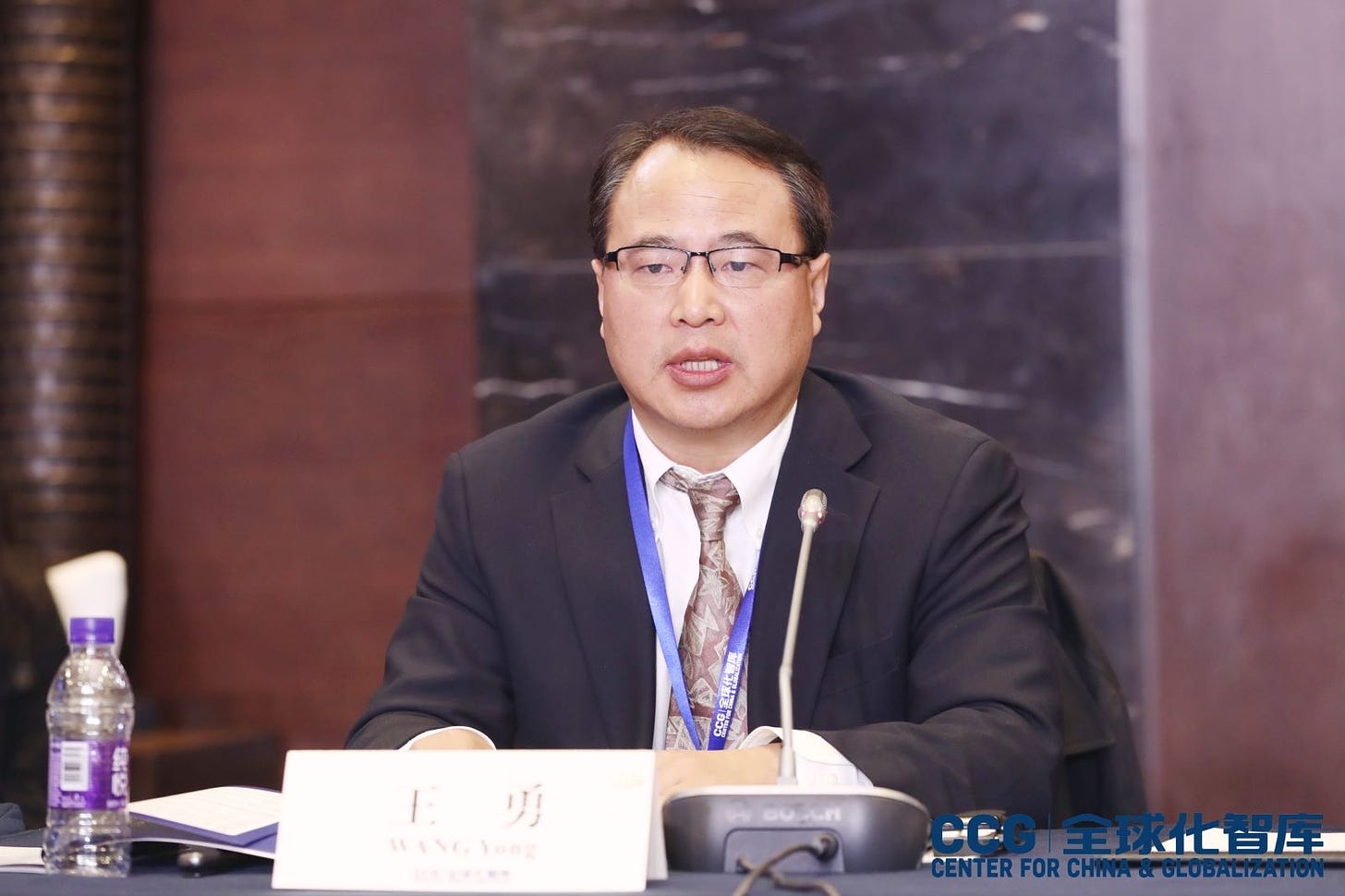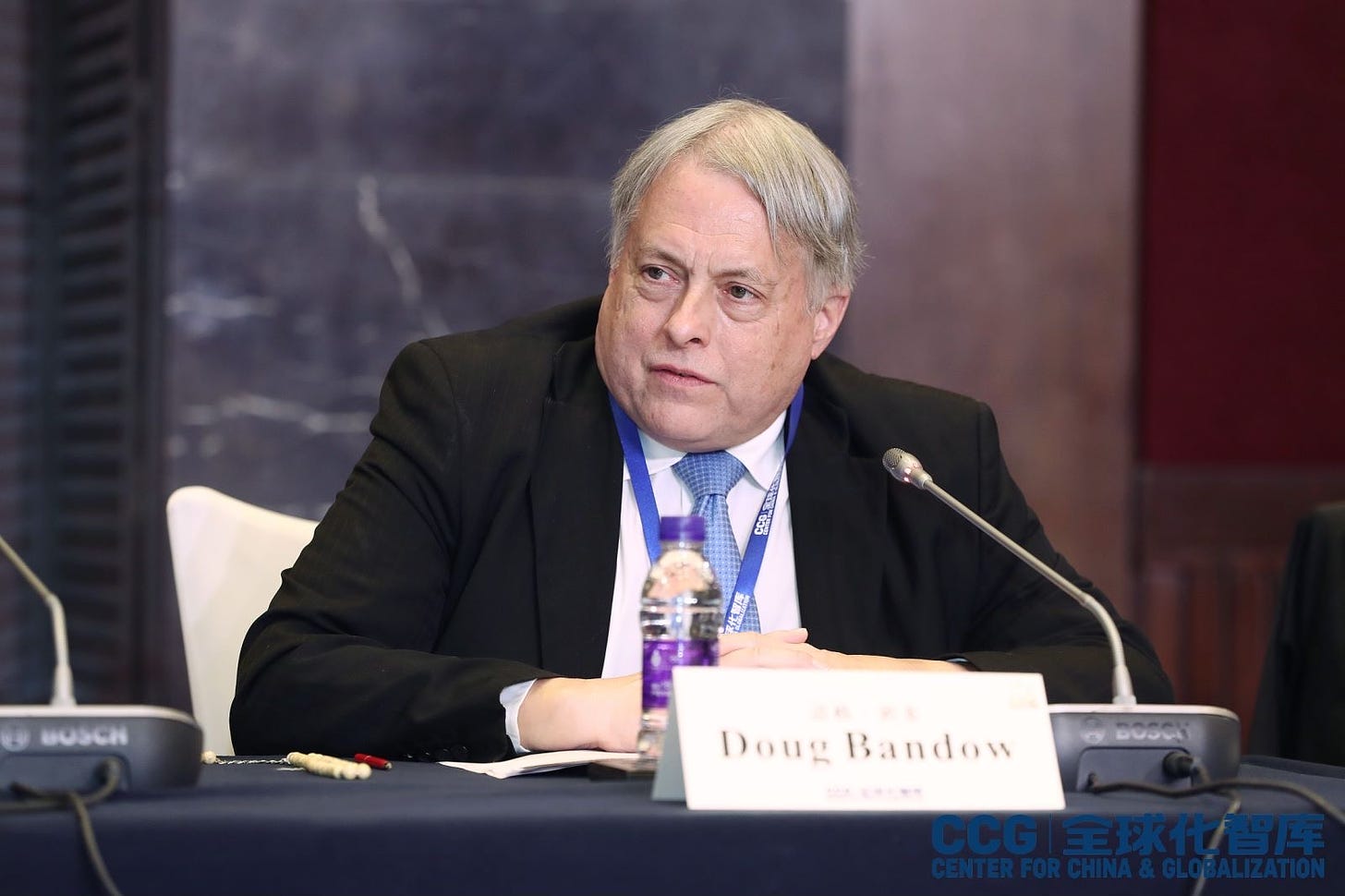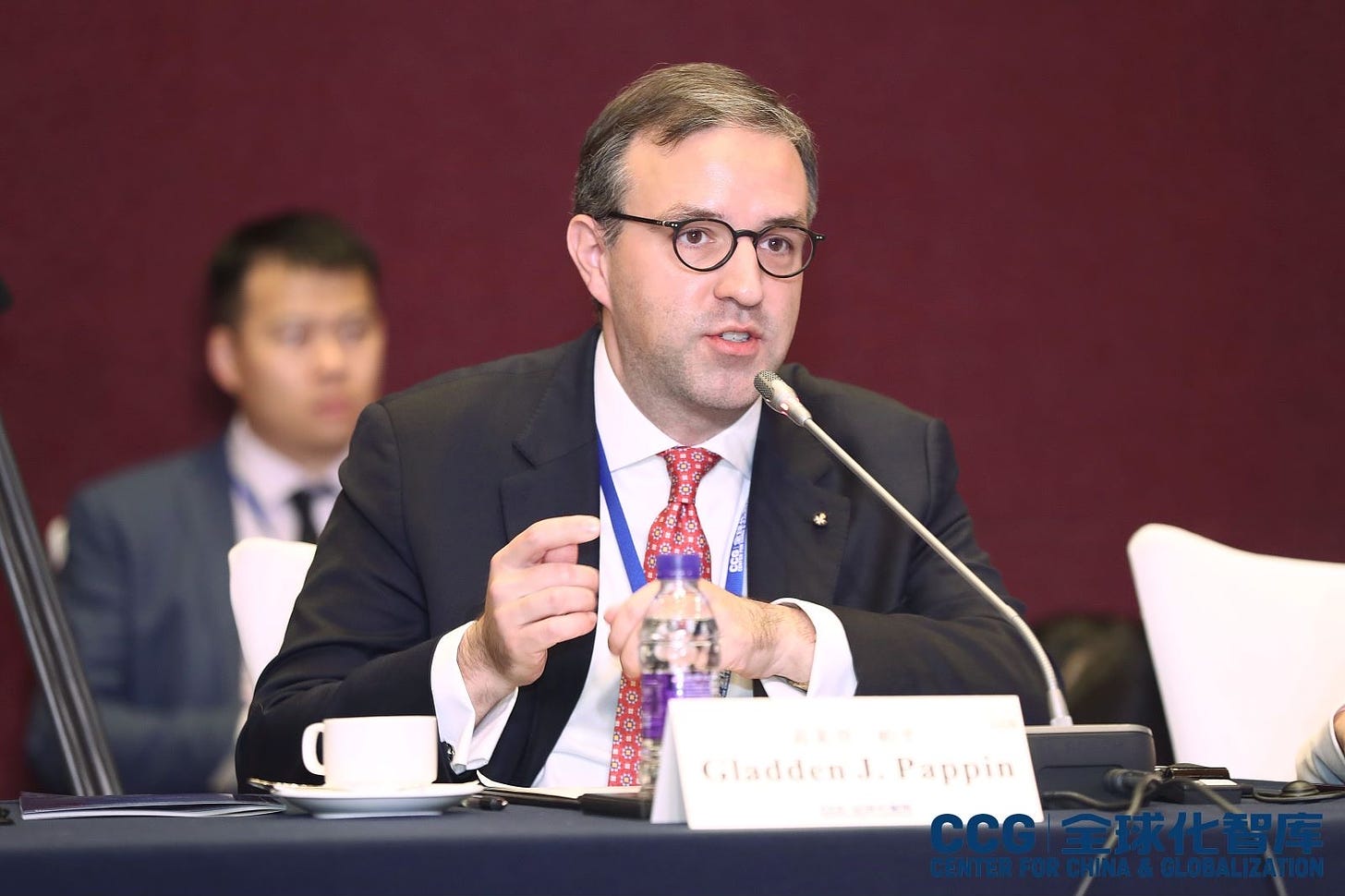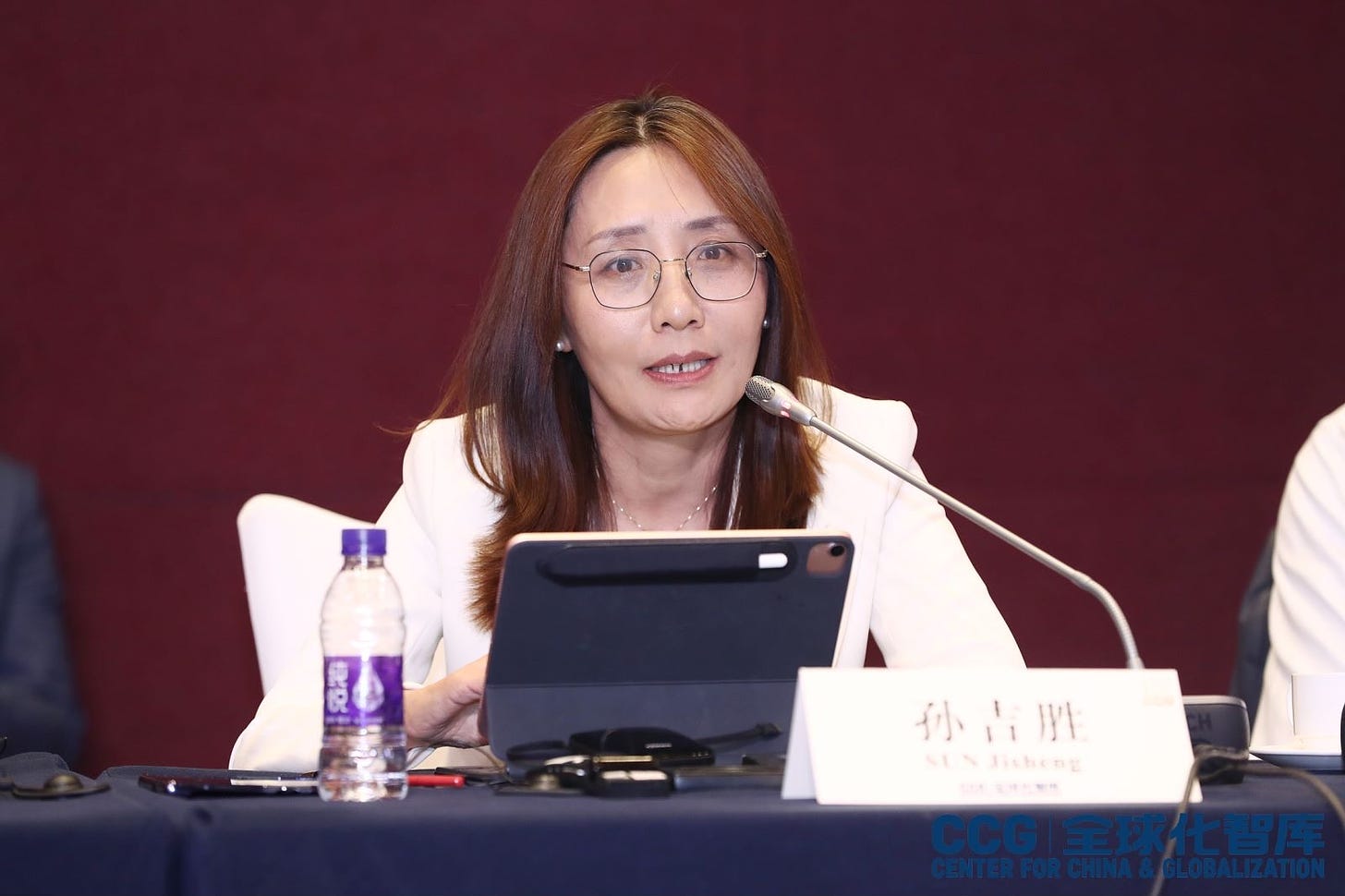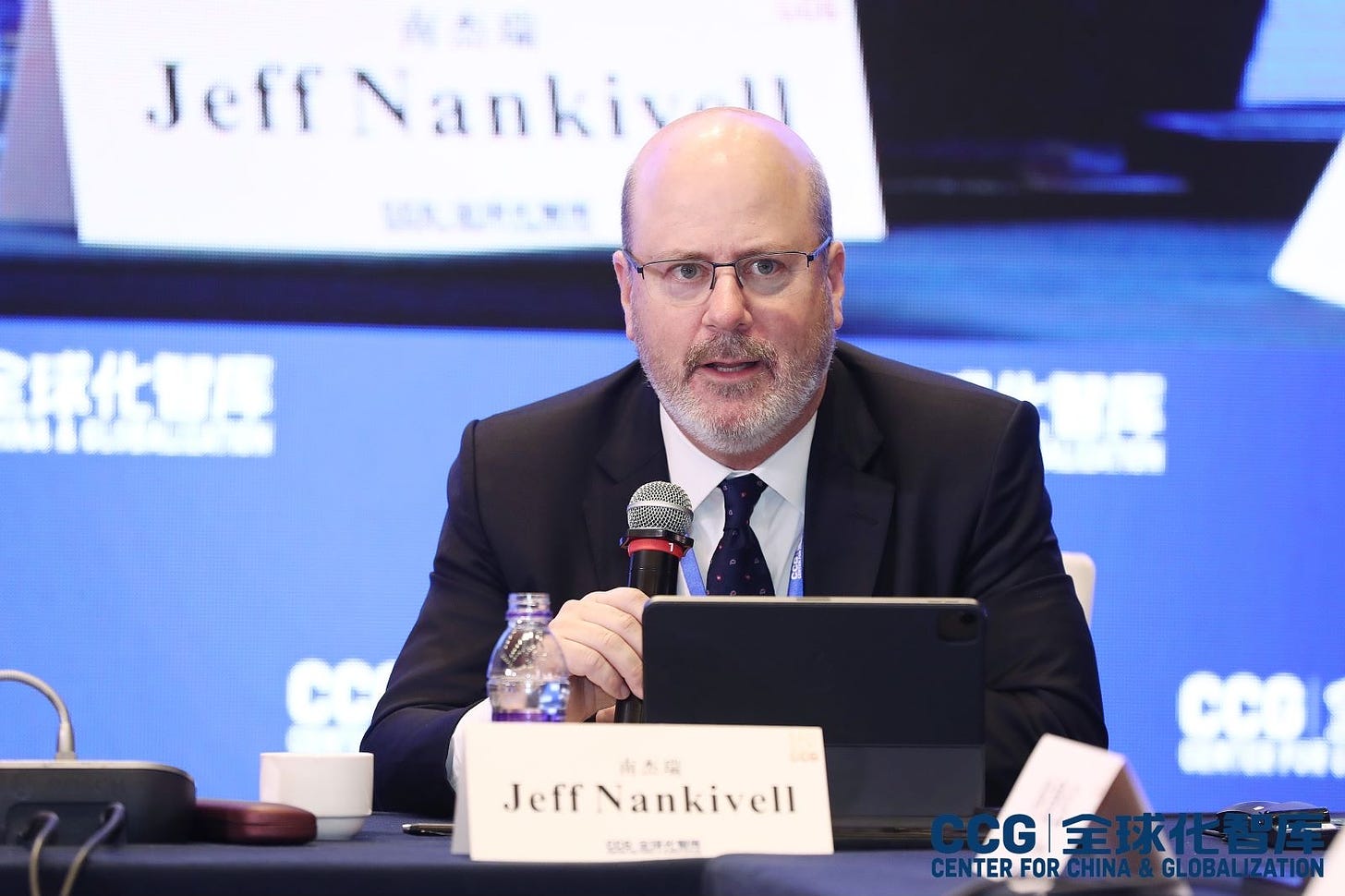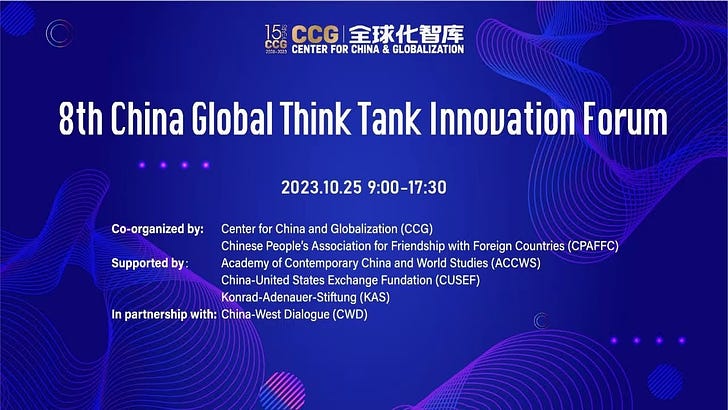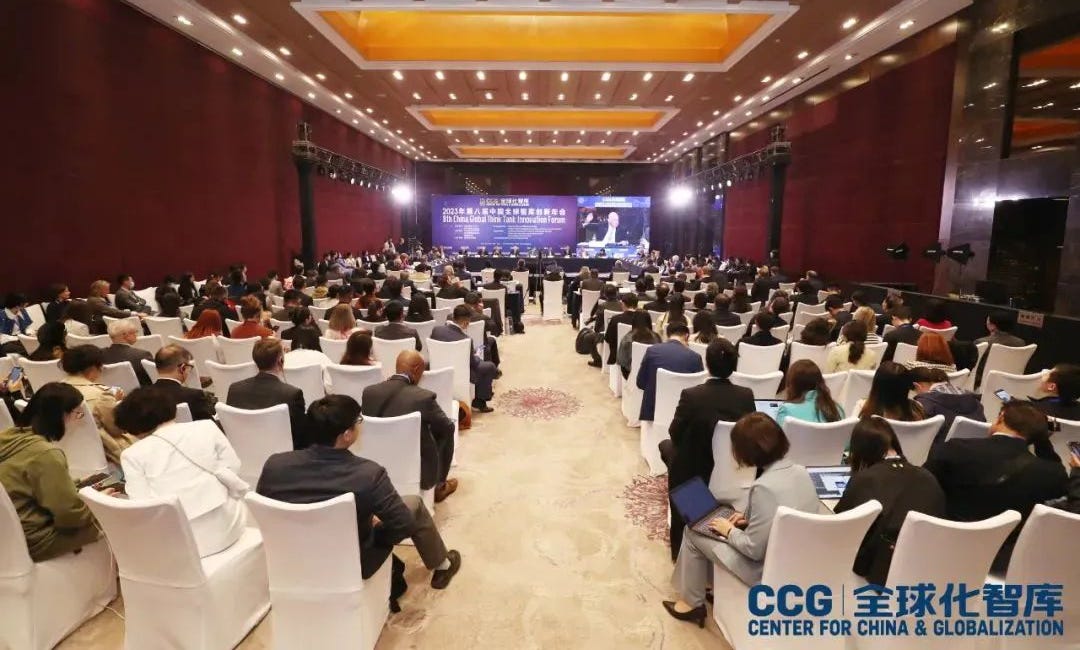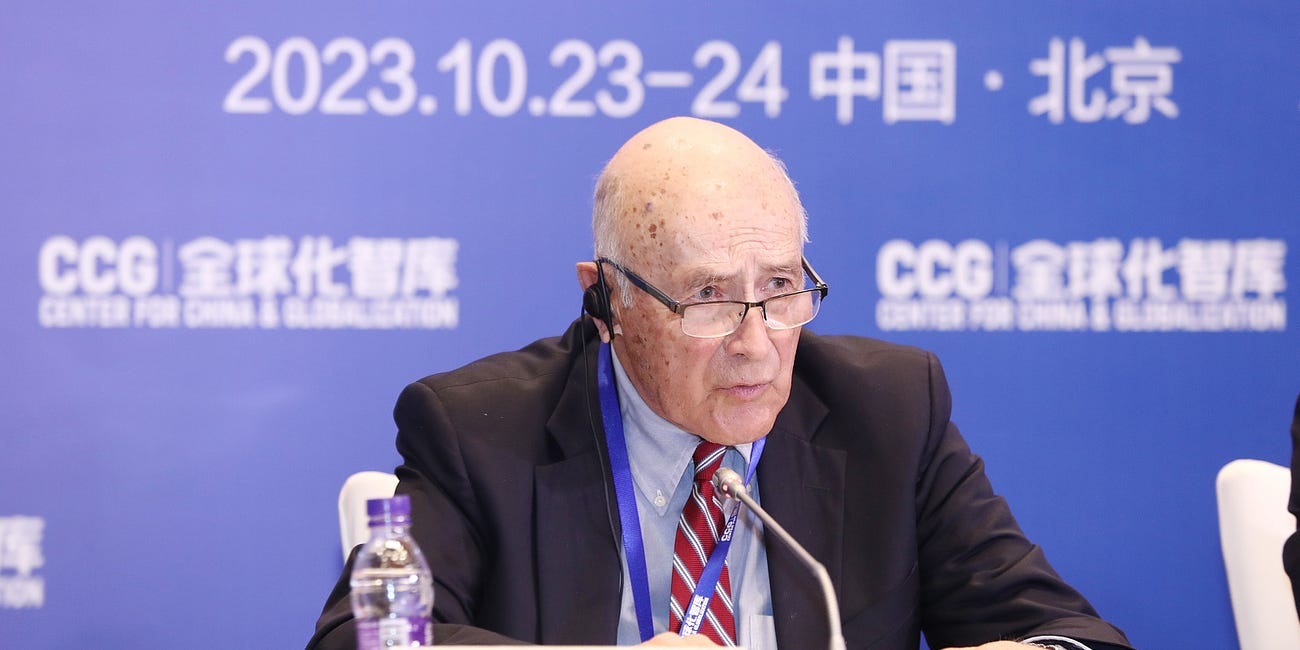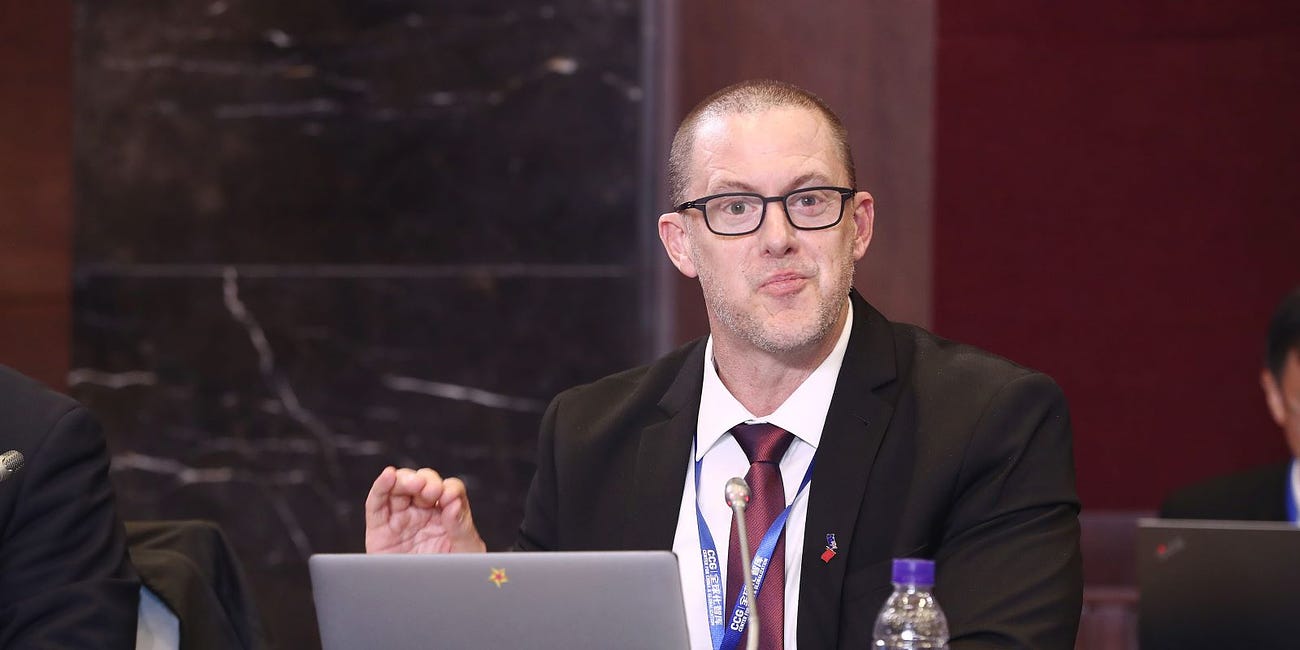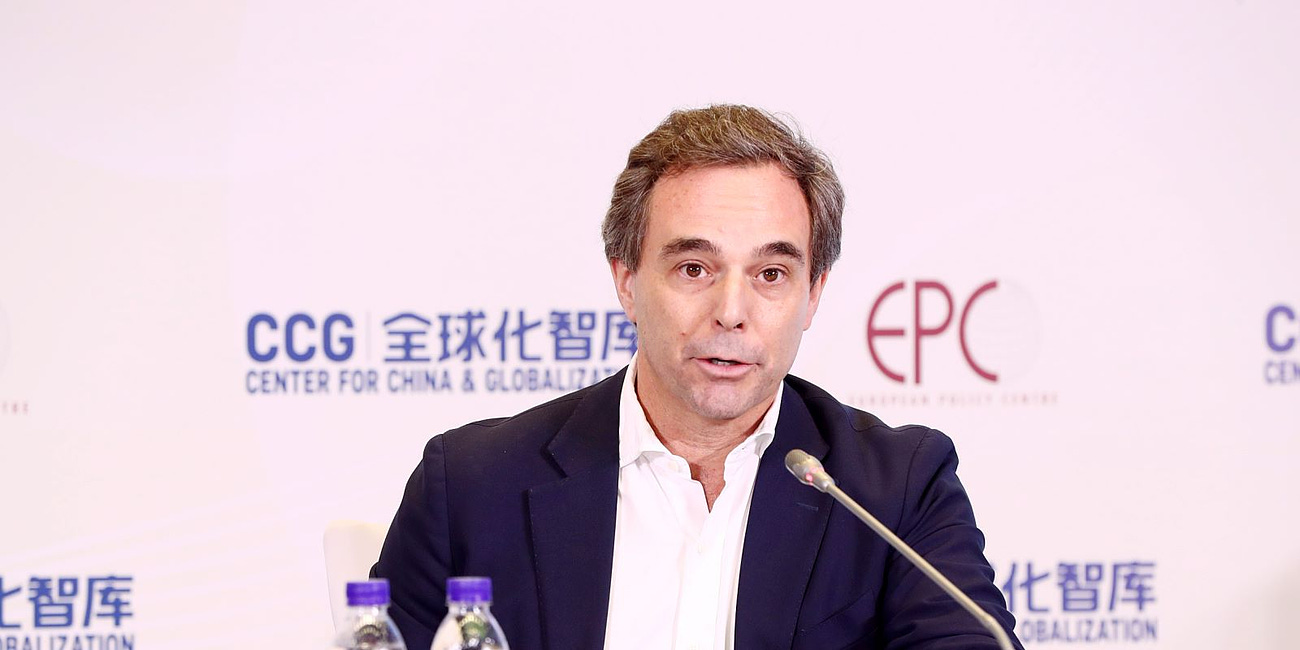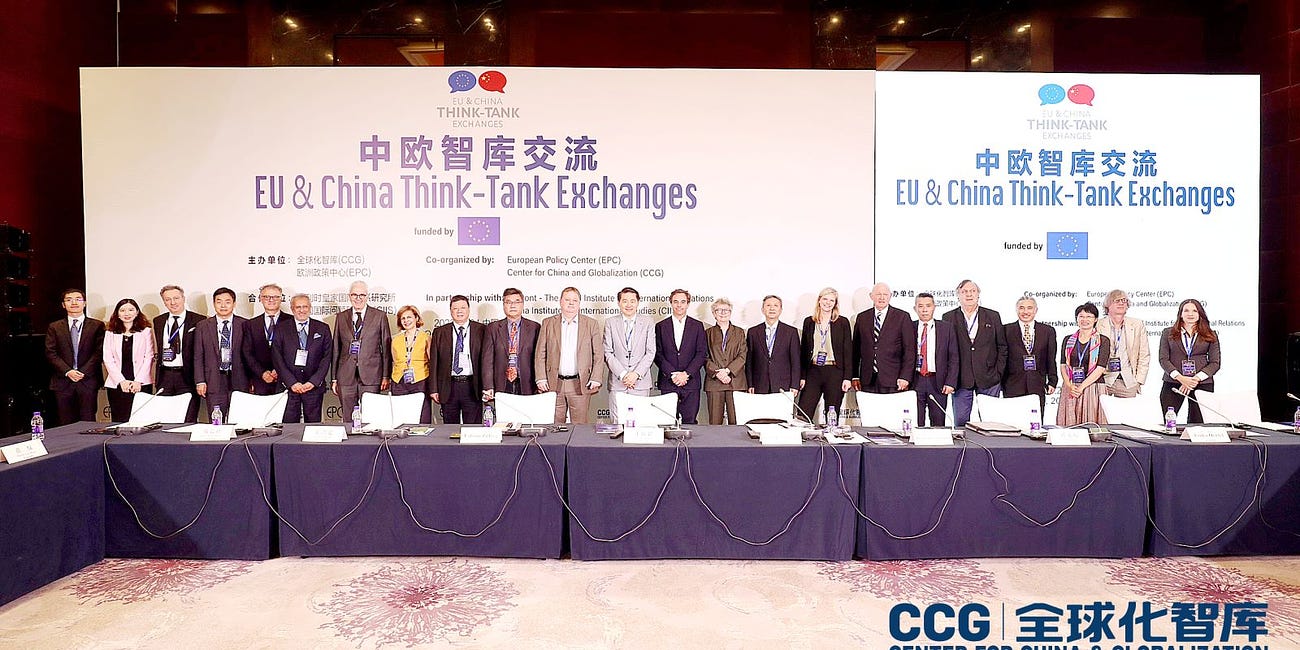Part II of Global Order at A Crossroads: Transcripts on Collective, Cooperative, and Constructive Global Governance
Bruno Liebhaberg, Shi Yinhong, Wang Yong, Doug Bandow, Gladden Pappin, Sun Jisheng, and Jeff Nankivell at the largest think tank gathering in China since COVID.
The following is Part II of the transcript of "The Global Order at A Crossroads: Ways Forward" roundtable from the 8th China Global Think Tank Innovation Forum. The roundtable was the second part of the Forum, following opening remarks by the heads of two organizers of the forum and two other Chinese guest speakers.
The Oct. 23 forum was organized by the Center for China and Globalization (CCG) and Chinese People's Association for Friendship with Foreign Countries (CPAFFC), supported by the Academy of Contemporary China and World Studies (ACCWS), China-United States Exchange Foundation (CUSEF), and Konrad-Adenauer-Stiftung (KAS), in partnership with China-West Dialogue (CWD).
This transcript covers the following 7 speakers:
Bruno Liebhaberg, Director General, Centre on Regulation in Europe (CERRE)
SHI Yinhong, Chairman of Academic Committee of the School of International Studies, Renmin University of China
WANG Yong, Professor and Director of Center for American Studies, Peking University
Doug Bandow, Senior Fellow, CATO Institute
Gladden J. Pappin, President, Institute of Hungarian International Affairs
SUN Jisheng, Vice President, China Foreign Affairs University (CFAU)
Jeff Nankivell, President and CEO, Asia Pacific Foundation of Canada
CCG Update has already published Part I of the roundtable, in addition to publishing and cross-posting the speeches by Michael Pillsbury, Joseph Nye, and James Laurenceson from the same event.
The full video is available on YouTube. It was also broadcast online by CCG and remains available in China both in English and Chinese.
Please note that this transcript is transcribed by CCG from the audio and video recordings and may contain errors. It hasn’t been reviewed by the speakers.
Bruno Liebhaberg, Director General, Centre on Regulation in Europe (CERRE)
Thank you very much, Henry, for the invitation to this very useful and very impressive gathering. You ask me how I look at things from Brussels; I'd say the global context is bad. It is bad regionally. We've mentioned wars in Europe. We have wars at the doors of Europe, in Ukraine. We see the rise of the extremes, of the political extremes in many countries in Europe. We have war in the Middle East, Israel against Hamas, unfortunately, probably as well now. We have tensions all over Africa: Libya, Niger, Ivory Coast, East Congo. And in the US, we have a volatile pre-electoral climate, with fear for the US and for the world, that the outcome of the next presidential election is not necessarily going to support multilateralism and make it move forward.
Globally, we see rising terrorism everywhere. In my own town in Brussels, we had a terror attack just a few days ago. Same in France last week and the week before. And then perhaps a word on climate change because I think it has a very important implication. The fact that the likelihood of global warming exceeding the 1.5-degree goal of the Paris Agreement is high and continues to rise. And the escalating risk of climate change, especially in the most vulnerable countries, is bound to have irreversible impacts on people, on species, on ecosystems, and as such, on our economies and our global governance. And I would not be surprised if not only in the South but also more broadly, in many countries all over the world, public governance becomes, in the years to come, more challenging and more fragile because of climate. We have, however, one piece of good news, and that is the scientific progress, which is moving faster and better than expected.
My second point is on the implications. The ideological polarization is increasing, and this restricts harmonious development, especially as regulatory priorities are politicized. We see polarization, ideological polarization on many fronts: north, south, east, west, developed, least developed countries, democracies, autocratic regimes, secular countries versus theocracies. And I think that if we look at the global issues, I want to get back to what our colleague Solheim said. I think climate is a good example of a global issue which is not polarized. And it's fair to say that the polarization of climate change has been decreasing significantly in the last years between China, Europe, and the United States. And I think it's fair to recognize that China has played a major part in that. China has implemented, since 2021, a national emission trading system, which is the world's largest in terms of carbon emissions and accounts for 40% of China's carbon emission. But the fight is not over. China is still responsible for 30% of the world's emissions. So, we appreciate all the work, which is being done here, and we are confident that these efforts will continue.
The situation is very different with digital. Digital is also a global issue. We have to face the benefits and the challenges of the digital ecosystems. And it's clear that we see now the challenges when members, when governments, try to take back control of the cyberspace. And since regulation is driven by a mix of economic interests and values, and values being the collective choices made by countries and regions, it's not surprising, against the background of polarization, ideological polarization, that I mentioned, that convergence is not necessarily the way those regulations are moving. And if we add the dramatic growth in geopolitical frictions and the lessons drawn from the pandemic, we see that this has led to this new concept, which is not existing only in the EU. Economic security is an issue for everybody: for Europe, for China, for the United States. And I think that the difficulty is when you try to regulate, you see that economic security is defense, security, and economy. And it's very complicated to get those things together. Just to move to the end of my remarks, we have a new landscape, ideologically polarized for digital regulation, governance, and globalization process. We have strong centrifugal forces, which are pushing the global digital economy towards deep convergence and, at the same time, towards segmentation into different subparts, as illustrated by the US-China technological decoupling, by Internet shutdowns in a number of countries, and other similar practices. And I think that the outcome of the tension between convergence and segmentation of the digital economy will have a very decisive influence on the future of the global economy.
So, what could be a constructive way ahead for global governance? In my think tank, the Center for Regulation in Europe, on regulation in Europe, we've been working on that, and we see that the starting point is the fact that we have a fragmentation of the Internet. And this is good for nobody. It's not good for China. It's not good for the US. It's not good for the EU. And so, with Pascal Lamy, with whom I'm co-leading this project, we have started a project called the Global Governance for the Digital Systems. And what we've seen is that globalization with firewalls is not the way ahead for the regulation of the global Internet. So, our goal is that we can keep, among others, through Track II diplomacy, a convergence and coexistence space for the global governance of the digital world. We realize that that space is very narrow, not least because the number of people authorized to speak out is shrinking, and that those who can speak do not necessarily dare to do so. So, to conclude, I would like to pose very candid questions to my distinguished Chinese friends: What do you think about the establishment of these cooperation corridors? In which part of the digital ecosystem can they be consolidated? How broad are they? And finally, in your view, what does the concept of cooperation still mean today in the world's complex situation? I'll be very happy to hear your views on this. Thank you.
SHI Yinhong, Chairman of Academic Committee, School of International Studies, Renmin University of China
Among the three metric great powers— the US, Russia, and China—two are deeply involved in their respective wars or even wars. China remains in peace, but peace is increasingly hard. So, for a minimum peaceful international order, a precondition is obviously the prevention of major conflict between China and the United States, with its core ally Japan. I would like to spend my 3 mins on this subject.
Between China and the United States, with Japan, emotional power politics dominates. There is clearly a reversed or ominous confidence in each other, through about decades of increasing tension and rivalry. China on one hand, and the United States and Japan on the other, generally have established confidences in each other's aggressive intentions and actions, with the fundamental order of the region, or even of the world, at stake. And this has become drastically, much more established, in the most recent years, mostly through interactions. Those about Taiwan, about the East China Sea, as well as the Sea of Japan, about the South China Sea, about the Korean Peninsula, about the arms race, about the China-Russia power alliance. So, the space for confidence building, in the conventional sense, has been much narrowed. With that, for preventing mutual conflict, is largely the only one that could be captivated.
In a highly regrettable circumstance, at present, high-level minister-to-minister communication, formerly suspended between China and the United States, and diplomacy fell largely into confrontation or general record or secondary and smaller problems. Tasks that should be defined include, I believe, 1st, to raise further the priority of avoiding military conflict in international policy agendas. 2nd, restoring high-level minister-to-minister communication as soon as possible, and for which the United States must abandon its guard railing definition and make it more frequent, more regularized, and at a higher level. Third, working out commonly acceptable principles and rules on military actions over major hot spots. Fourth, the problematic approach taken in diplomatic communications should decouple, as fully as possible, international security concerns from domestic spillovers. And finally, to change the ways of so-called information warfare, or propaganda, making it based on facts of each other's factual military actions, rather than perceived intentions, especially those that are generalized. Thank you for your attention.
WANG Yong, Professor and Director of Center for American Studies, Peking University
The world is at a crossroads. It is a very important discussion today. I would like to use three words to describe the challenges and tasks that we are now facing. One is the tremendous challenges we have seen. It is the end of the Cold War order. We have passed the good times, the last 30 years. The world starts to play in a greater power rivalry. And the rising ethnic territorial conflicts everywhere.
So, I think what we are seeing now is domestic state governance and international governance failing to address these challenges. On one hand, we have seen the explosion of wealth growth in the last 30 years, but we have also seen the widening wealth gap in almost all countries, especially in leading countries like the United States, E.G. So, we have seen political polarizations and the rising of nationalism in many other countries. On the other hand, we have seen the failure of international coordination and cooperation. We have observed that international institutions, such as the IMF and World Bank, haven't been able to prevent or stop the international financial crisis. The World Bank hasn't delivered the growth and development goals to the developing countries. The WTO has failed to conclude the Doha round of negotiations, now under the opposition of many members, hindering its working and operations. So, we face tremendous challenges. To some extent, we can argue that the world is moving to the threshold of a new World War. We have seen signs reminiscent of World War One and World War Two in the global political, economic, and security situations.
Secondly, tremendous catastrophes might be waiting for us in the near future if we cannot find solutions.
The third word is tremendous opportunities. We need real democracy in domestic state governance to prioritize the people's interests, the goals of development, justice, fairer distribution of wealth, and more effective governance domestically. In international governance, the existing institutions should reform themselves to include more countries on an equal footing and to innovate measures and mechanisms to work together to address these challenging issues. We also need real democracy to be integrated into current and innovative international governance institutions. So, the last word highlights great opportunities for think tanks like us. There are echoes to the voices and opinions from the floor. The representatives of the think tanks here should work together and reach consensus on these crucial issues: challenges, dangers, and opportunities for building consensus on the reform of state and global governance. We, as scholars and experts of think tanks, have the responsibility to show the world direction and hope. Thank you very much.
Doug Bandow, Senior Fellow, Cato Institute
It certainly is a time of rising international discord. There is much to discuss. And to give a short answer to James, the question of whether policymakers in Washington recognize their own limitations was answered by President Biden in his speech this past week. He quoted Madeleine Albright about the US being the "indispensable nation." I do not perceive the limitations you may be looking for. I think that we see an international system that is under extraordinary stress, a part of which has been mentioned earlier: our military and security attentions. What we see, I believe, are very difficult issues around the globe, ones that have the potential for expanding in very dangerous ways. We certainly see in Europe an active combat between Russia and Ukraine, as well as a proxy war supported by the United States and Europe, which has its own potential for expanding in dangerous ways. We see in the Middle East extraordinary bloodshed and instability introduced by the conflict between Israel and Hamas, and the potential for forces like Hezbollah and others coming in; this could also expand in very dangerous ways, with major powers involved, especially the United States. And we see increasing tensions in East Asia, as Michael mentioned, regarding the question of Taiwan, changes in policy there that have moved us to a new normal with greater tensions and a set of dangers. All of these are occurring simultaneously. We see very important economic issues, international debt problems, especially focused on the Global South.
This is not new. I came to the Reagan administration 40 years ago when many of the debt problems occurring at that time required restructuring and transformation of the World Bank, IMF, and other institutions. So, we need to look for ways to solve the current crisis and hopefully avoid another repeat in the future. We see major governments around the world that have their own domestic debt problems. I might note that my own country is one. As far as I can tell, no one in Washington believes that they should have to pay for the benefits they want to provide the American people. At some point, that approach stops working. And we see other governments around the world with many of the same kinds of problems. We also observe population declines in many important countries, which may have unpredictable consequences for the future in places like Europe, China, and South Korea. In countries with working populations declining, even in the United States and others, we see reductions or plateaus in growth. We also witness significant social and political problems, both internationally and domestically, around the world. We notice sharpened rivalries among great powers as well as middle powers, some of which have their own potential dangers. One might imagine, for example, a nuclear North Korea with ICBMs that can reach around the world, equipped with multiple warheads and nuclear weapons, transforming the potential threat in dramatic ways. There are issues with Iran and other countries as well. We see divisions among people, increasingly along lines of religion and ethnicity. And we also notice the rise of populism as a political force, as mentioned earlier in Europe. We see it in the United States and, I believe, in many ways, in India and other countries. This kind of populism, especially when mixed with nationalism and sentiments of ethnic and religious superiority, presents its own sets of dangers.
The question of how to move forward is challenging to answer in just 3 or 4 minutes. I think the starting point is that the large powers have the greatest obligation to find a way to work together, to move past their differences, cooperate, and contain the impact of the consequences of their disagreements. This is particularly important for the United States and the People's Republic of China. These two great countries must coexist, find a way to work together, and ensure that the 21st century remains peaceful in terms of great power conflict, avoiding war. The role of middle powers, I believe, is taking on increasing importance: how to counter and challenge malignant middle powers, but also to accommodate and respect those that want more involvement. Addressing issues like North Korea is problematic in its own right. South Korea now boasts an economy in the world's top ten. India has surpassed the PRC with the second-largest population and has a growing economy. In the Middle East, we face problems of ethno-nationalism and religion across the board, from an Islamist Iran to a very different Israel that today has a radical government. In other countries, such as Brazil, Nigeria, and South Africa, and on other continents, there's a desire for a greater share of international decision-making. The question of how to incorporate these nations is critical for us all. And then there's the Global South: both aiding its development and holding it accountable for its government's failures. The Global South wants greater respect and influence in the world. This will be a significant issue in the coming years. In this context, NGOs, and particularly think tanks, have a vital role to provide innovative solutions and to look beyond the interests of their governments. Governments should respect the role of think tanks, welcome them into the policy-making process, and be prepared to accept some criticism. Governments can learn effectively if they incorporate feedback from their citizens rather than rejecting it.
We live in challenging times, as has been said, and it's essential to understand that this isn't just about economics or money, but in many ways, potentially, about survival. It's crucial to look beyond assigning blame and to be willing to accept responsibility for many of the problems we face. The blame is widely shared, and we must come together to address these issues. We must prioritize long-term goals over immediate political gains. There's much to do, and I hope additional forums like this can play a role in fostering discussions that outline solutions for the future. Thank you.
Gladden J. Pappin, President, Hungarian Institute of International Affairs
So, I just wanted to say a couple of words, and actually start with a question that I've encountered already in the last day, which is, why is Hungary attending a conference on globalization? Isn't Hungary the marquis European state that's regressing to populist nationalism or something like that? And it's a fair question because that's what is said in the international media frequently. But actually, Hungary is now, and always has been, in favor of a particular type of globalization that also allows it to maintain its identity. And we believe that there are a lot of states, a lot of middle powers, rising middle powers, and regional states, that feel the same way. And so, for that reason, the Hungarian strategy is a strategy of connectivity on the basis of preservation of its national identity, culture, and tradition. And I don't want to be too backward-looking or provide too much commentary on the last 30 years, but I think we could say that at times, there have been elements of the presentation of globalization over the last 30 years that have too much emphasized an expectation that all cultures and countries would abandon their traditional ways and merge into one gigantic, global, consumer-driven culture. And that the expectation was that in that world, it doesn't matter where anything is made, borders are going to go away, traditions will fade away, etc. I think we can all agree that world is definitely not materializing. So, there are some differences between the Hungarian position and the older principles of liberal globalization. Hungary is against mass migration and is in favor of preserving its traditional family structures and supports a strong family policy. But in fact, we view those as essential to creating and sustaining our ability to make links with a lot of different cultures and a lot of different economic partners. Hungary is the 11th most complex economy in the world, despite its very small size, and given its location in Central Europe, is likely to benefit from a lot of new trade routes and general geopolitical shifts that will make that part of the world continue to be more important.
So, our theory of connectivity is a little bit different from the old one, but we believe that it reflects a new and growing consensus among smaller powers, that the way to navigate the world is in a multivector way, that we can be part of different security arrangements, but also have multiple economic cooperation. Unfortunately, this is not always well received by some of our American friends. There was an American think tank visiting me in Budapest not too long ago, and they said, you know, you guys really need to focus much less on East-West connectivity between Hungary and Asia, and more on North-South connectivity. And I had to stop and ask, well, who do you think is building the Budapest–Belgrade north-south Railway? And I didn't get an answer to that question. So, I think, we're in favor of a peaceful transition to a multipolar world. And I know it seems more and more implausible that it will be something that's peaceful. But it's, we believe that it's, you know, from our own history of having seen the perils of bloc formation and the difficulties that that causes for states that are caught on the periphery of those boundaries, we believe a lot of states are thinking the same way. And so the connectivity project that our institute is launching, will hopefully be a platform that we can continue this discussion on. Thank you very much.
SUN Jisheng, Vice President, China Foreign Affairs University (CFAU)
Well, the theme of this round table is "The Global order at a crossroads: ways forward." At crossroads is the most important thing. The most important thing is we need to guarantee the direction is right, otherwise, we will not be able to walk into the future, but step back into the past. So, related to crossroads and direction, I would like to focus on three points.
The 1st one is we need to guarantee the direction of the world order. In the past several years, we have heard different comments, judgments, predictions about the world order. We hear fragmentation, division, or disorder, or even the collapse of world order. So, the reason that we have so many problems with the world order, on the one hand, is related to material power, the distribution of power. On the other hand, it is also related to many ideational factors. So, so far, if we want to guarantee the right direction of the world order, I mean all the world, especially the major countries, need to work out a right direction for the world order. We need to guarantee that the world order will be more inclusive, more open, and can accommodate different actors for the world today, not only major countries but also new, emerging countries, and the developing world.
Besides, we also need to guarantee that we get rid of, or we think less about geopolitics, geopolitical competition, less of a zero-sum game, more of a one-community sense. Because if we cannot do that, simply, we cannot guarantee the right direction of the 2nd point, that's global governance. We have come across different kinds of global challenges. Because in the past years, probably, we talked about traditional global governance problems. But from this year, we turn back to talk about traditional security problems, such as the Ukraine crisis or what is going on in the Middle East.
We live in a global village, but also, we live in a digital era. Things can produce a spillover effect very easily. If any of these global issues cannot be handled properly, then the whole world probably will be in a disaster, so that will not only influence security but also probably the survival of all human beings.
And then the 3rd direction I would like to focus on is what is the right direction for think tanks. Because usually, for think tanks, the most important thing for us to do is to figure out problems and figure out the solutions. But I think at this crossroads, we not only need to recommend policy choices, but also, we need to do more to build consensus. Consensus building. Because we not only influence the government, policymakers but also will influence the general public. So, we need to educate the public to help to construct a kind of cooperative, friendly, and more one-community sense language. Otherwise, it will be extremely difficult for the world to cooperate and collaborate at the crossroads. That's all. Thank you.
Jeff Nankivell, President and CEO, Asia Pacific Foundation of Canada
Thank you very much, Mr. Chairman. And a big thank you for bringing us all together. We definitely need more of this kind of thing in the world. And I think that's come through quite clearly. Allow me to apologize that the adventures of traveling from Canada have brought me here, just landing this morning, and now I have the burden of being the last speaker and following Professor Nye. I am, however, unburdened by not having heard much of the earlier presentations. So, excuse me if what I say may have some repetition, but I think it actually flows very well from the last couple of presentations.
Speaking as a Canadian and as a citizen of a country that has been active in multilateralism since the first concepts of multilateralism found practical application in the last century, I'd like to focus on the practical issues, the things when we talk about cooperation and competition in the international order. Every few speeches, it's important to bring ourselves back to what is it that we want to achieve for our people around the world in creating systems, rules, norms, and so on. And I think there are two really pressing issues that are top of mind in almost every corner of the globe. Both relate to the changes we are all experiencing through the rapid development of our climate situation: its food security and the urgency for climate action.
On food security, the practical challenge is how we can organize ourselves in this world to ensure that supply chains for food and for inputs related to food production are as robust as possible, while keeping food affordable for the broad mass of society. This affects people at the household level, all across the globe, and will be a major determinant of the citizens' level of satisfaction with their own governments and leadership. Leaders are very focused on this everywhere. Effective action on this to meet these very practical objectives will require a very high degree of international cooperation, both bilaterally and multilaterally, to ensure that trade is as free as possible, that export restrictions are minimized, that standards are harmonized, and that technological innovations in areas, such as alternative proteins and advanced plant breeding techniques, can be shared both quickly and safely. We have seen in the last century the enormous benefits to human welfare from technological innovation in agriculture. But we live in a world now where regulatory cooperation and harmonization are going to be absolutely essential if we are to make progress and ensure that our societies are resilient in the face of climate change and the impact it has on the agri-food sector.
And then, when it comes to climate mitigation, as we all know, it requires a very high degree of international cooperation and discipline to raise standards and to raise levels of commitment and to avoid free riding. This is especially important, I think, as we go into the next couple of decades, in a context where we will have climate disasters that will continue to be more frequent and more dramatic in their impacts, regardless of the positive actions we take on mitigation. And there is a significant challenge for political leaders of the next generation, over the next 20 years. Because even if we achieve a fantastic degree of cooperation and discipline in taking the essential actions to meet targets to reduce the rate of global temperature rise by 2050, in the 2030s and 2040s, life is going to get more difficult for people in households worldwide. Governments and intergovernmental bodies will have to answer to those populations, making it essential for government legitimacy for leaders worldwide to work together on that and to avoid vulnerabilities that could be exploited by populists, sometimes in the interest of finances.
I'd like to mention here there's a mechanism, a non-governmental, essentially non-intergovernmental mechanism, that has offered a practical model of cooperation for over three decades, based right here in Beijing. It's the China Council for International Cooperation on Environment and Development. Conceived in the early 1990s, it began as a partnership led by China and Canada and was really focused on China, but it brought experts from around the world and international organizations to discuss environment and development challenges. This has lasted for over three decades. It's an extraordinary testament, I think, to vision and leadership from agencies and ministries of the government of China to continue inviting experts from around the world for these discussions. This is a model of how to stimulate innovation through applied research with a very practical focus. To meet these objectives will require a new commitment to effective multilateralism. Middle powers look to the leading powers for this. Recent behaviors aren't encouraging in this regard, but we need to form, as broadly as possible, a coalition of the willing to push for a renewed commitment to practical multilateralism to address the shared challenges Professor Nye highlighted.
Finally, I would say for think tanks, it strikes me that we have many forums in the international system for talking but think tanks should be the mechanism for listening. We all have an important job to do in attending gatherings like this and working with each other to bring back to our audiences, whether they're domestic, regional, or global, what we learn and hear. There's a lot of talking in the world, but there's a deficit of listening. I'm so happy to be here to listen, and I look forward to hearing from all of you. Thank you.
Again, this transcript is transcribed by CCG from the audio and video recordings and may contain errors. It hasn’t been reviewed by the speakers.





